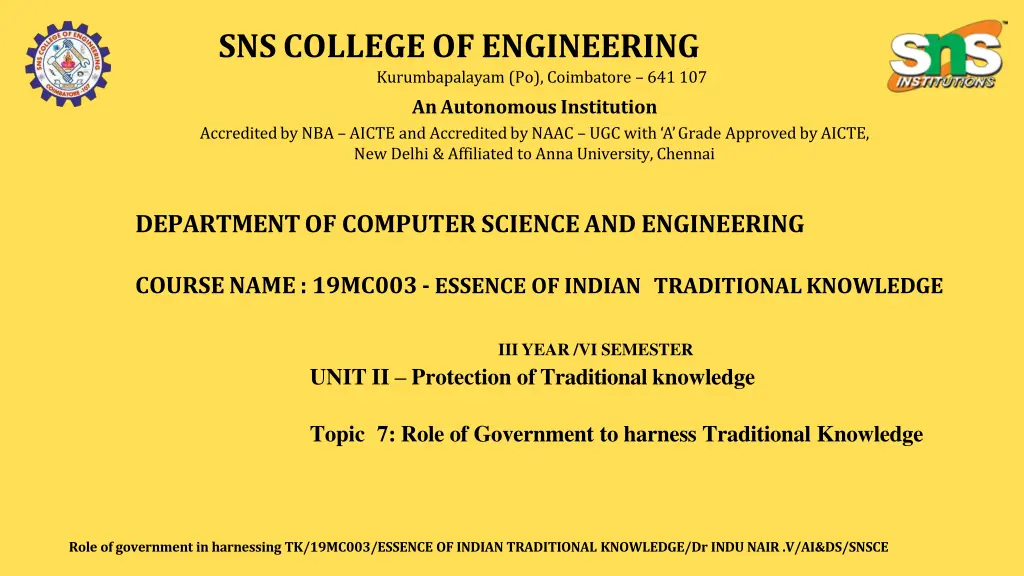
Government Role in Protecting Traditional Knowledge
Discover the significant steps taken by the Government of India to safeguard traditional knowledge from patenting, including the establishment of a Traditional Knowledge Digital Library, direct funding through CSIR, and recognition of traditional medicines as UNESCO Intangible Cultural Heritage. Learn how these initiatives contribute to the preservation and authenticity of India's rich traditional medicinal techniques.
Uploaded on | 1 Views
Download Presentation

Please find below an Image/Link to download the presentation.
The content on the website is provided AS IS for your information and personal use only. It may not be sold, licensed, or shared on other websites without obtaining consent from the author. If you encounter any issues during the download, it is possible that the publisher has removed the file from their server.
You are allowed to download the files provided on this website for personal or commercial use, subject to the condition that they are used lawfully. All files are the property of their respective owners.
The content on the website is provided AS IS for your information and personal use only. It may not be sold, licensed, or shared on other websites without obtaining consent from the author.
E N D
Presentation Transcript
SNS COLLEGE OF ENGINEERING Kurumbapalayam (Po),Coimbatore 641 107 AnAutonomousInstitution AccreditedbyNBA AICTE and AccreditedbyNAAC UGC with A Grade ApprovedbyAICTE, New Delhi & Affiliated to Anna University,Chennai DEPARTMENTOF COMPUTERSCIENCEANDENGINEERING COURSENAME: 19MC003- ESSENCE OFINDIAN TRADITIONALKNOWLEDGE IIIYEAR /VI SEMESTER UNIT II Protection ofTraditional knowledge Topic 7: Role of Government to harness Traditional Knowledge Role of government in harnessing TK/19MC003/ESSENCE OF INDIAN TRADITIONAL KNOWLEDGE/Dr INDU NAIR .V/AI&DS/SNSCE
ROLE OF GOVERNMENT IN PROTECTION OF TRADITIONAL KNOWLEDGE Traditional medicinal techniques in India have a long history dating back thousands of years. These approaches and components have recently come to light as a consequence multinational corporations' desire to profit from the information they have acquired. The government has worked hard to prevent information from being patented. Role of government in harnessing TK/19MC003/ESSENCE OF INDIAN TRADITIONAL KNOWLEDGE/Dr INDU NAIR .V/AI&DS/SNSCE
Following steps taken by Government of India to protect traditional knowledge from patent. (a). Traditional Knowledge Digital Library Digital library put up by the government that has all of the information about conventional medicine, including the procedures and practices that go along with it. As a storehouse for all current conventional procedures, this helps with the verification process. Thanks to this library, which offers access to different patent offices throughout the globe so that they may double-check the legitimacy of the patent, thousands of international patent applications have been blocked. Role of government in harnessing TK/19MC003/ESSENCE OF INDIAN TRADITIONAL KNOWLEDGE/Dr INDU NAIR .V/AI&DS/SNSCE
b) Direct funding The federal government has stopped paying states and other organizations that do traditional knowledge research. Instead, the CSIR has been designated as the single entity responsible for conducting such research. The money is given to CSIR directly. This will keep research from falling into the hands of private pharmaceutical corporations. Role of government in harnessing TK/19MC003/ESSENCE OF INDIAN TRADITIONAL KNOWLEDGE/Dr INDU NAIR .V/AI&DS/SNSCE
c). UNESCO Intangible Cultural Heritage Traditional medicines including Ayurveda, Yoga, Sowa Rigpa, Unani, and others have been recognized by UNESCO. As a result, India has been able to establish a direct connection to the source country and avoid patenting by global pharmaceutical corporations. Role of government in harnessing TK/19MC003/ESSENCE OF INDIAN TRADITIONAL KNOWLEDGE/Dr INDU NAIR .V/AI&DS/SNSCE
(d). Strengthening IPR India's intellectual property laws have already been updated to include all types of property rights. Cultural communities' traditional knowledge will be protected under the new form's rules. The key goal will be to prevent third parties from exploiting the economic interests of such organizations. Role of government in harnessing TK/19MC003/ESSENCE OF INDIAN TRADITIONAL KNOWLEDGE/Dr INDU NAIR .V/AI&DS/SNSCE
(e). National Innovation Foundation (NIF) Along with the TKDL, the NIF is another ground-breaking commitment from India to safeguard and promote traditional knowledge. NIF's main objective is to foster and assist in the conservation of cultural heritage knowledge. It is a group of professionals tasked with helping knowledge holders in safeguarding their innovations under the current IPR regime. They assist individuals who are mostly unaware of legal complexities that their TK may possess along with their miraculous knowledge in conducting prior art searches and filing patents, among other things. In the year 2000, the Government of India's Department of Science and Technology established the National Innovation Foundation (NIF) with the goal of stopping bio piracy on the one hand and protecting TK and Ancestral Knowledge's intellectual property rights on the other. As a result, the rich knowledge that the land is known for is preserved. The Honey Comb Network, which began its journey in the 1980s, owes its existence to the tireless efforts of eminent Professor Anil Gupta of IIM, AMD, and his team. SRISTI (Society for Research and Initiatives for Sustainable Technologies and Institutions) was founded in 1993 to help unearth TKs from all over India Role of government in harnessing TK/19MC003/ESSENCE OF INDIAN TRADITIONAL KNOWLEDGE/Dr INDU NAIR .V/AI&DS/SNSCE
Conclusion: The government of India has taken several steps to protect traditional knowledge of medicine from patenting by pharmaceutical companies, including the creation of the TKDL, mandatory prior art search, ABS framework, TKRC, TKPO, and inclusion in the National IPR Policy. These measures aim to ensure that traditional knowledge is not misappropriated for commercial gain and that the benefits arising from the use of traditional knowledge are shared with the communities that have generated or maintained such knowledge. Role of government in harnessing TK/19MC003/ESSENCE OF INDIAN TRADITIONAL KNOWLEDGE/Dr INDU NAIR .V/AI&DS/SNSCE
